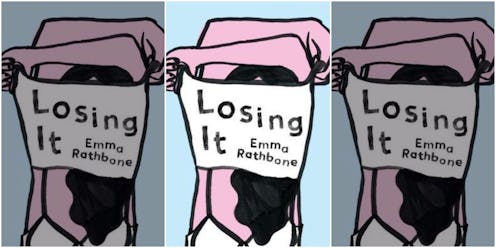Books
How 'Losing It' Sheds Fresh Light on Virginity

Often, discussions about being sex-positive center upon respect for a person's decision to have sex and to have sex in the way that pleases them. Too often, virginity goes ignored or misrepresented. But in her new novel, Losing It, Emma Rathbone gives readers a wonderfully nuanced perspective on virginity and the stigma surrounding it.
Out July 19 from Riverhead Books, Losing It is easily one of my favorite books of the summer. As entertaining as it is smart, this book and its engrossing characters will have you hooked until the last page. Losing It is the story of a 26-year-old woman, a virgin, who feels as though her life is going nowhere. In an attempt to shake up her routine, she upends her entire life and moves to North Carolina to live with her estranged aunt. Once there, she decides that losing her virginity is a top priority. But then she discovers that her 58-year-old Aunt Viv is also still a virgin. Frightened, appalled, and confused by this piece of intel, Julia struggles to reconcile her aunt's situation with her own quest for fulfillment.
Throughout this fantastic story, Rathbone does a killer job of depicting virginity in all of its complexities. She makes Julia's experience so true-to-life and relatable. Here are just a few of the ways Losing It breaks stereotypes about virginity:
Losing It by Emma Rathbone
1. People are virgins way past their teens.
Television and the mainstream media would have you believe that everyone loses their virginity at the age of 16, and anybody and everybody else is a loser with a capital "L." But that's really not the case. Plenty of people wait until their twenties or later to lose their V-card, and Rathbone illustrates that beautifully.
2. Virginity is not always about religion or abstinence pledges.
You're not always a virgin because you made a promise to God or believe that sex before marriage is wrong. Sometimes, you're a virgin because you just haven't met the right person or you're just not ready or it just hasn't happened yet. And that's OK.
3. Virgins still have sexuality.
Virgins are not all super prudes. Julie clearly isn't; her mind is full of sexual fantasies and desires. We even read along as she imagines the sex lives of the different people she meets.
4. Being a virgin in your 20s or older can put a lot of pressure on a person.
Which is really what this book is all about: Julia feeling the pressure to have sex. We see that Julia believes something is truly wrong with her because she's a virgin, that everything will change once she has sex. She blames her aunt's entire life on her virginity, when really it's just a piece of the puzzle.
5. Sometimes being a virgin can make you feel glaringly different.
As the story progresses, we see how self-conscious Julia is about her virginity and how that impacts many of her decisions. It's constantly on her mind, and readers can see how she feels like she doesn't quite fit in sometimes because of it.
6. No matter your experience, the right partner will not shame you and will work to make you feel comfortable.
As Julia works to find a situation that's right for her, she encounters some situations that just don't feel right. Even though Julia is desperate to lose her virginity, she assesses every situation she lands herself in, and pulls out of situations that just don't feel right.
Losing It by Emma Rathbone, $11, Amazon
Images: Giphy (3)